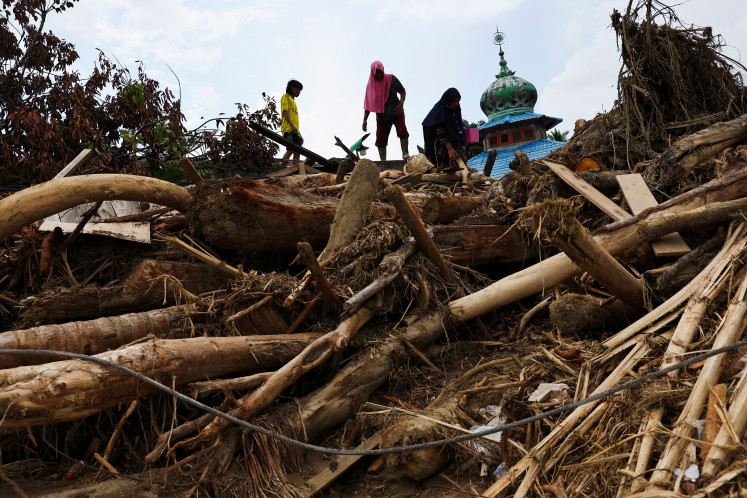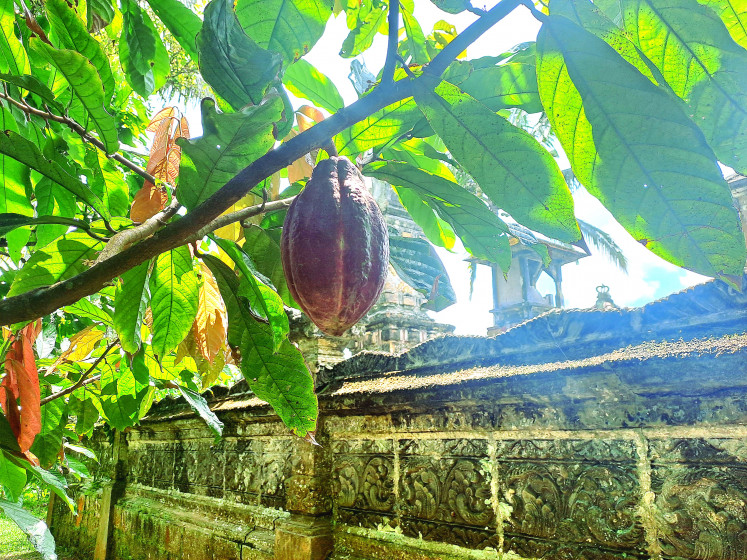Popular Reads
Top Results
Can't find what you're looking for?
View all search resultsPopular Reads
Top Results
Can't find what you're looking for?
View all search resultsCandidates share common visions, differ in wording
Navigating the way forward: Shafiah Muhibat, head of international relations at the Centre for Strategic and International Studies (CSIS), speaks at a discussion about the foreign policies and defense orientations of presidential candidates at the CSIS auditorium in Jakarta on Wednesday
Change text size
Gift Premium Articles
to Anyone
N
avigating the way forward: Shafiah Muhibat, head of international relations at the Centre for Strategic and International Studies (CSIS), speaks at a discussion about the foreign policies and defense orientations of presidential candidates at the CSIS auditorium in Jakarta on Wednesday. Others to speak at the event included (from left) lawmaker Meutya Hafid, member of the Prabowo Subianto-Sandiaga Uno campaign team Rizal Darmaputra and lecturer at the Indonesian Defense University Kusnanto Anggoro.(JP/Seto Wardhana)
The candidates in the 2019 presidential election will not make dramatic changes from the current positions in defense and foreign affairs although there might be subtle differences in rhetoric and approaches, a public discussion heard on Wednesday.
Kusnanto Anggoro, a lecturer at the Indonesian Defense University, said that it was not easy to compare both camps’ visions and missions as incumbent President Joko “Jokowi” Widodo and his running mate Ma’ruf Amin had a document of some 7,000 words while Prabowo Subianto and his running mate Sandiaga Uno had a document of about 3,000 words.
He said Jokowi’s camp used the term “to continue” and was justifying what he had achieved in his first term in the document.
“On the other hand, Prabowo has to offer something new, so he uses a lot of ‘to accelerate’ and ‘to increase’ in his vision and mission document,” Kusnanto told a public discussion held by the Centre for Strategic and International Studies (CSIS) in Jakarta.
He also said a number of terms were absent from both documents, although this was understandable. “Prabowo, for example, does not use the word ‘diplomacy’, which is understandable because diplomacy is an instrument of foreign policy,” he said.
Kusnanto added that Prabowo did not use the word ‘intelligence’, because as a former military officer, intelligence was already part of his remit.
“On the other hand, Jokowi does not use the words ‘economy’ or ‘security’ in handling communal conflicts, which are actually part of governance,” he added.
Kusnanto was commenting to the presentations made by Golkar Party lawmaker Meutya Hafid from Jokowi’s camp and Rizal Darmaputra, a member of the expert council in Prabowo’s camp.
Meutya said Jokowi would continue his current performance.
In defense, she said, instead of simply modernizing the major weapon systems, Jokowi’s camp would also continue military reform and transformation by paying more attention to servicemen’s welfare.
Meanwhile, Rizal said Prabowo’s camp was focusing on maintaining Indonesia’s long standing free-active foreign policy, achieving strong maritime sovereignty, and guarding the country’s territorial integrity.
He said one of the avenues to reaching those goals was by having an independent defense industry. “Our defense industry, however, is still focusing on assembling components and not yet conducting research on and upgrading alutsista, [primary weapons systems]” he told the
audience.
He added that a strong defense industry would help the military in preparing a capable striking force and standby force.“A strong standby force is needed for disaster mitigation and for peacekeeping operations,” he said.
Another participant was Shafiah F. Muhibat, head of the CSIS’s international relations department. who said that foreign affairs were not an interesting topic for most voters.
“Voters are more interested in economy, welfare and development issues,” she said.
Shafiah added that with the free-active foreign policy, Indonesia did not attach itself to any major powers, such as in the power struggle between the United States and China.
Meutia agreed, by saying that Indonesia would never follow the US as long as Washington still considered occupied Jerusalem as the capital of Israel.
“On the other hand, we will still cooperate with China,” she added.
Observers, for example, have criticized Jokowi for being too insular and focusing too much on domestic affairs.
In his defense, however, CSIS executive director Philip Vermote said that Jokowi had from the beginning stressed that diplomacy would strengthen the country’s economy by bringing tangible economic benefits.
“But in the second term, I believe Jokowi wants to leave a legacy in both domestic and international issues,” he told The Jakarta Post on the discussion’s sidelines.
“Especially as Indonesia will start its tenure as a non-permanent member of the United Nations Security Council.”
Your Opinion Matters
Share your experiences, suggestions, and any issues you've encountered on The Jakarta Post. We're here to listen.
Thank you
Thank you for sharing your thoughts. We appreciate your feedback.










